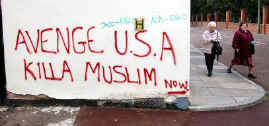The desire to appear color-blind leads most Americans to prefer the standardized language of diversity-speak when addressing issues of race, rather than the other way around. The researchers conclude that American diversity-speak is a sort of 'happy talk,' an upbeat language in which everyone has a place, everyone is welcome and even celebrated.
Example: If we understood Muslims better, we might not have launched a disastrous war in Iraq. We might have saved thousands of lives and billions of dollars.
Example: If we understood American Indians better, we might uphold their treaties and sovereign rights. That would give them additional resources to pursue economic development and combat social ills.


Writerfella here --
ReplyDeleteThe problem is, Americans perceive their enemies to be anathema and then never forget or forgive such a perception, even if the enemies lose. The Indian Wars ended with the defeat of the Indians. But even now, the Indians are 'the enemy.' Even if the Iraq War (Gulf War II) was winnable, after it was all over, the Iraq insurgents still would be the enemy. writerfella likes certain lines in the film, THE PHILADELPHIA EXPERIMENT, in which unwilling time travelers from 1944 find themselves in 1984 and thus are astounded to find that Germany and Japan are friends to the US and that Russia and China then are the enemies. It is not explored, but it is indicative of the fact that perception of 'enemies' never changes, no matter how much time has passed. It is not logical, but it most often is true...
All Best
Russ Bates
'writerfella'